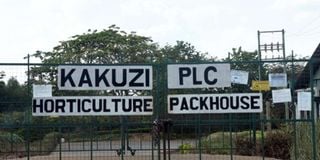Premium
Makuyu Club handed 72-acre golf course as Kakuzi loses ownership case again

What you need to know:
- The company further said Kakuzi was the one paying wages of the golf course employees, providing items of equipment to guards such as coats and torches, and providing building and maintenance materials.
- Justices Gatembu Kairu, Jessie Lesiit and Grace Ngenye-Macharia said supplying water to the club, lawn mowers, paying workers and supporting through donations and such like activity do not qualify as asserting one’s right to property.
Members of Makuyu Club in Murang’a County have won against listed firm Kakuzi Limited after the Court of Appeal ruled that the 72-acre parcel of land where the club sits belonged to them.
The appellate court upheld the decision in favour of the club in a long-running dispute with Kakuzi, noting that the golf club members started using the land in 1934.
The Court of Appeal said the club had exclusively used the contested land as a golf course since then, and remained in use even when the agricultural firm bought the expansive land in 1967.
Kakuzi claimed that the members of the Makuyu Club had been using the 72 acres as a golf course with its express knowledge and consent and that of its predecessor.
The company said it has been the one supporting the club by helping in maintenance of the golf course by supplying diesel oil, petrol lubricants as well as lending tractors and lawnmowers and paying wages for clubhouse guards.
The company further said Kakuzi was the one paying wages of the golf course employees, providing items of equipment to guards such as coats and torches, and providing building and maintenance materials.
Justices Gatembu Kairu, Jessie Lesiit and Grace Ngenye-Macharia said supplying water to the club, lawn mowers, paying workers and supporting through donations and such like activity do not qualify as asserting one’s right to property, as it did not have the effect of interrupting the members’ possession, or of dispossessing it of the property.
“We have come to the conclusion that the learned judge’s judgement cannot be disturbed, that it was well articulated and that the learned judge came to the correct conclusion of the case,” said the judges.
Kakuzi submitted that the club members have never used the land exclusively and instead, it was the company that used the portion of its property as a golf course, for its agricultural activities such as grazing of cattle and cutting grass for hay, use of the track through the property for its various activities without having to seek any consent from the club or without hindrance.
The company argued that the club was formed sometime in 1999 and Kakuzi contributed towards the maintenance of the golf course by supplying manpower, fuel for the tractors and other financial support.
In July 1998, the company erected a fence along Sagana Road without any hindrance from the club as the members had no capacity to hold immovable property and cannot in law maintain the case.
The company said the 12,795-acre parcel initially belonged to Makuyu Sisal Limited and was granted the parcel of land for a term of 941 years and two months from June 1, 1966.
The said land was transferred to Kakuzi Fibrelands Limited and the transfer registered on December 8, 1967 and on July 29, 1971, Kakuzi changed its name from Kakuzi Fibrelands Limited to Kakuzi Limited.
The club, through Joel Wanyoike, a trustee, contended that 70 acres or thereabouts out of Kakuzi’s land was donated to it by White settlers in 1934 for the use of a golf course long before the company was formed.
Through lawyer David Mereka, the club maintained that the portion was given to Makuyu Sisal, the predecessor of Kakuzi, for the use of a golf club by its members.
Mr Mereka said the club has exclusively used the said portion, had landscaped it, constructed the tee boxes greens and made a makeshift shed for the bar, dug a pit latrine, sank a borehole and had installed a pump to irrigate the golf course.
The club said its occupation was open, without force and without any interference from Kakuzi.
The judge agreed with the club, saying by writing to Kenya Power, informing it not to supply electricity to the club as the land belonged to it, and preventing the members from fencing off the land did not amount to assertion of right as envisaged.
“First, in regards to KPLC, the appellant wrote a letter passing information to a third party. Secondly, writing the letter did not have the effect of dispossessing the respondent of the suit property, nor did it have the effect of terminating the possession or interrupting the respondent’s (Club’s) possession,” said the judges.




